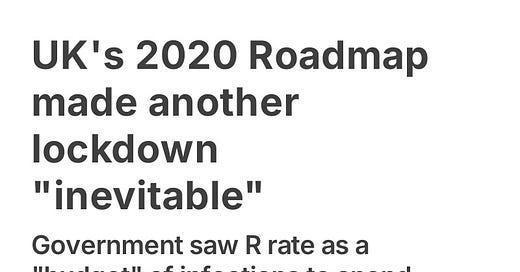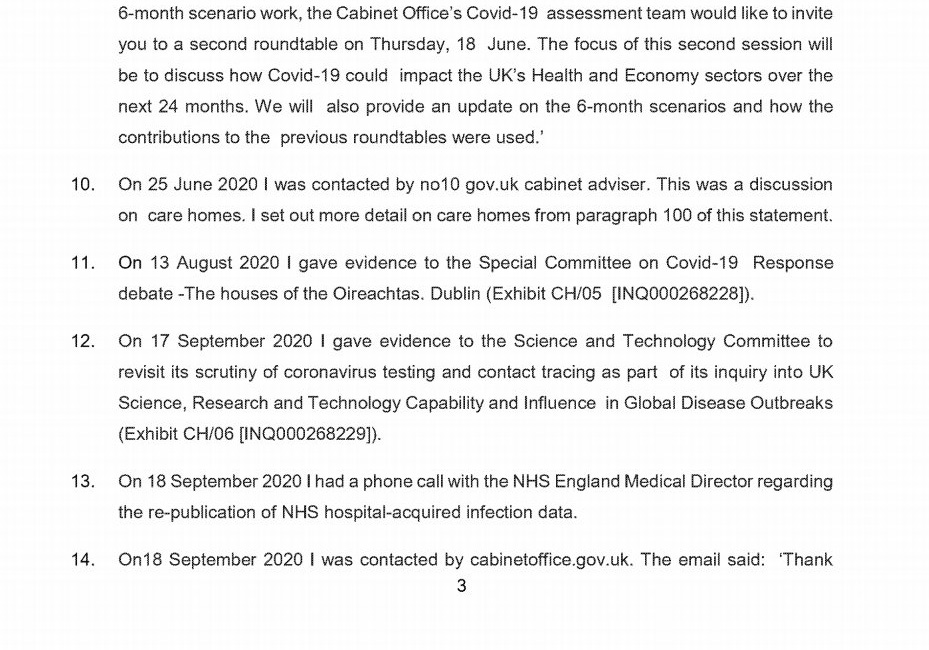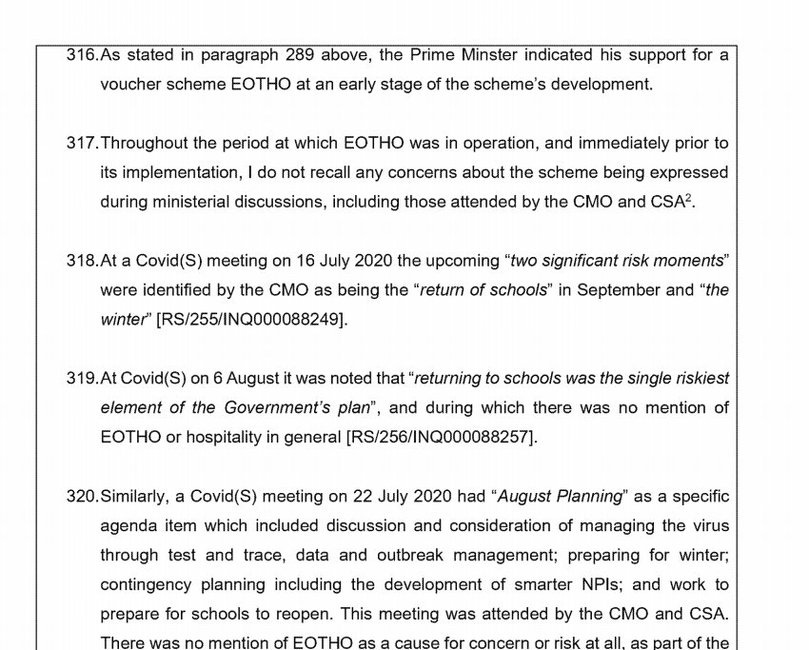UK's 2020 Roadmap made another lockdown "inevitable"
Government saw R rate as a "budget" of infections to spend over summer 2020
After a considerable delay due to ill health Simon Case finally appeared at the Covid Inquiry in May 2024 to give his testimony. From April 2020 Case was director general in the Cabinet Office before becoming permanent secretary to Number 10.
Case described the top of government when he entered as an environment where the behaviour of individuals in Number 10 and the Cabinet Office was “toxic”. This only began to improve once Dominic Cummings departed the role of being Johnson’s adviser.
The inquiry was told by Case; in testimony, that the mentality around the May 2020 roadmap focusing on the economic harms of measures made future lockdowns almost inevitable.
Case confirmed he felt there was a culture of fear preventing people from speaking up in meetings and described some of the people around Boris Johnson as “feral”. The relationship between Johnson's political adviser Cummings and Lord Lister, Martin Reynolds and Stuart Glassborrow in the Number 10 team was “very bad”, and someone turned down a role in Number 10 to manage a particular aspect of the response because “The set up is too mad to touch.”
The inquiry also discussed how Cummings’ trip to Bernard Castle caused considerable damage to public trust and adherence to measures.
Case explained that where Sir Patrick Vallance had said in his diary about the Bernard Castle incident that Case had “had a go” this referred to Case having a “go at trying to get them (Whitty and Vallance out of the press conference” after Cummings took questions in the rose garden. Case thinks Cummings said to Whitty and Vallance “of course you can't be there, because you'll be asked about Bernard Castle,” demonstrating how the incident interfered with government communications. Case concluded “I'm sure to the bereaved it sort of feels like a terrible insult.”
Johnson was described as Ideologically opposed to lockdowns. At the time Case didn't understand how at “quite a deep, ideological level” Johnson was opposed to lockdowns and that difficult decisions he had to make "affected him so viscerally…it had an impact upon the proper management of the system.”
Decisions were made in Number 10 before being presented to the cabinet and there were issues with policy being produced without consultation with experts.
The inquiry saw a WhatsApp exchange from 25 April 2020 between Case and Helen MacNamara, deputy secretary to the cabinet where Case said it was “Genuinely shocking” that two unnamed people in a room made up the proposals on schools returning with “not a single expert involved in the conversation”, adding later “Real lives being played with here.”
MacNamara responded with disbelief that “There is a genuine suggestion that we secretly do different things with schools,” suggesting that in her opinion there were individuals at the top of government who thought “we should experiment with people's lives”.
Second wave
Case said that in retrospect, when preparing to give testimony he had recently come to the conclusion that the need for further lockdowns in a second wave was essentially set in motion in May 2020 with the roadmap out of restrictions and the mentality fostered inside government.
Those at the top of government had taken to thinking of the reproduction rate of the virus as an “R budget” similar to a Treasury budget. The dominant thinking inside Downing Street was that as long as R didn’t tip over 1 into exponential growth then they could continue to reduce measures leading to an increase in transmission
As Case explained “The R budget mentality meant thought: well, ok, if R is 0.6, that means we've got 0.4, so let's unlock as fast as we can up to the point of 0.4.”
This acceptance of allowing transmission meant that the UK entered autumn with higher incidence than comparable countries in Europe so that when measures were introduced they didn’t have the same impact on transmission that was seen in countries with lower incidence rates.
The inquiry was told by Case that the key theme of the discussions around the May 2020 roadmap was “balancing covid health and outcomes against the economic consequences of lockdown”, and that in his role of Chancellor Rishi Sunak focused on putting forward the economic argument against measures. Case was asked about comments he made at the time in a WhatsApp conversation with Johnson. “It can’t always be you agreeing with Rishi”, and “You can’t always bend to the will of the Chancellor, you are the Prime Minister”. Case replied that it was a “statement of the blindingly obvious relationship between the two of them.”
Cases’ testimony contradicts Sunak’s inquiry appearance when the prime minister claimed he’d had very little influence on decision making.
On Eat Out to Help Out, Case said he was unaware of the scheme until it was announced at cabinet on 8 July, and was led to believe Johnson thought the scheme had been discussed with scientific advisers.
“To some extent the die cast by the beginning of September”, said Case, because the roadmap out of first lockdown was dates not data with a “very clear drumbeat.” Case believes that measures like test and trace were never going to work in a “high-incidence environment.”
“Prisoners of our own mentality…which was we were desperate to avoid another lockdown.”
Whitty and Vallance were very concerned tiers wouldn't work
Case agreed with the 20 September meeting with Sunetra Gupta, Carl Heneghan and Anders Tegnell occurred because Johnsonn“wanted to hear alternative views to, because he'd been criticised quite roundly in the press.” As previously reported in the Byline Times right wing media outlets opposed to lockdown had considerable private access to Johnson in the run up to the decision to have a circuit breaker lockdown.
The contribution at that meeting which really stood out for Case came from Anders Tegnell, architect of Sweden’s response “he gave a very astute observation about how Sweden works very differently,” compliance to guidance was high without the need for legislation.
Long Covid
Although he can’t remember precisely Case believed Chris Whitty started talking directly to the Prime Minister about Long Covid in the late summer/early autumn of 2020. Case says at the time there “was this idea that it was just fine for children to get covid” when he remembers Vallance being clear that “it wasn’t as straightforward…there could well be lasting impacts of covid.”
Case could not remember Long Covid being discussed in detail in 2020 but thought that it was factored more into decision-taking in 2021.
Further Reading
Covid Inquiry: Sunetra Gupta's witness statement
There has been a considerable effort in much of the media to distort public perception of the UK Covid Inquiry, arguments are being made that it isn’t addressing the effectiveness of measures, the harms of lockdown and needs to take the views of alternative experts. Snippets of statements from the hearing have been quoted as if they were gotcha moments …
"Silenced and censored" Carl Heneghan's list of interactions with UK government in 2020
High profile anti-lockdown academic Professor Carl Heneghan has revealed in his witness statement to the covid inquiry that he had 25 interactions with the government in 2020, including multiple times with the Cabinet Office and No 10. The witness statement brings into question claims from sections of the media that voices opposing lockdown were silen…
"Schools was the single riskiest element" Sunak's Inquiry witness statement, August 2020
A single passage of Prime Minister Sunak’s witness statement to the UK Covid Inquiry has been released. The media focus has been on his comments about the Eat Out to Help Out scheme, Sunak says the government’s experts didn’t express concerns about the scheme, however during their hearings the government’s most senior advisers said they hadn’t been cons…
Covid Inquiry: Concerns with former Children's Commissioner Anne Longfield's witness statement
The role of the UK’s Children’s Commissioner is to represent the rights of children in regards to government policy with reference to the UN Charter on the rights of the child, this includes the right to be free of preventable disease.
UK Covid Inquiry: Gavin Williamson's Witness Statement
Before looking at Williamson's Witness Statement, its worth noting what it doesn’t include, no consideration from him regarding the harms of covid infection to the school population.








